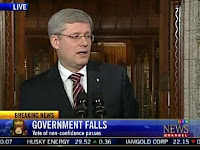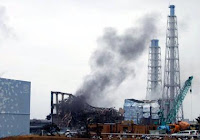I know most Americans don't pay much attention to their cousins north of the border, but our federal government has just been accused of contempt of parliament (first time ever - and about time too), and it has been defeated on a confidence vote and forced to call an election (probably by May 2). One of the blessings of the Westminster System (Canada) is short election campaigns, or ones that go on forever depending on your point-of-view. We have had a minority government here for years, a bit unstable you might think, but this is Canada after all, land of peace, order and good government (I dispute the last bit), so not unstable at all. In fact markets are calm, not much changes really except that printers will have lots more revenue, as lawn signs sprout like dandelions and propaganda pamphlets flutter in the breeze.
As a result, I'll be taking a bit of a break from my usual rants for the next five weeks or so, possibly focussing less on the world and being a little more partisan and inward looking in my posts than I have been. I'm planning to run for parliament in my riding (electoral district) like I did in 2008.
I'll miss the rest of the world. Things are still bad in Japan, Fukushima Number 3 has likely had a core breach, but not-to-worry it won't be worse than Chernobyl, at least according to the pundits and they have been right all along so far ;-).
The Arab Spring has been spreading, now to Syria and Jordan, and who knows where that is going to lead. NATO has taken over in Libya - more Canadian content there.
Tomorrow is earth hour (again), a celebration of darkness and stupidity. But I will be busy, the lights will be on.
I might keep a daily record of my drive to certain defeat during this campaign, I will keep you posted. The bad news is I plan to run in a Provincial(State) election in October. That one is planned, which is a bit strange for Canadian elections because they tend to be spontaneous. I'll be back.
As a result, I'll be taking a bit of a break from my usual rants for the next five weeks or so, possibly focussing less on the world and being a little more partisan and inward looking in my posts than I have been. I'm planning to run for parliament in my riding (electoral district) like I did in 2008.
I'll miss the rest of the world. Things are still bad in Japan, Fukushima Number 3 has likely had a core breach, but not-to-worry it won't be worse than Chernobyl, at least according to the pundits and they have been right all along so far ;-).
The Arab Spring has been spreading, now to Syria and Jordan, and who knows where that is going to lead. NATO has taken over in Libya - more Canadian content there.
Tomorrow is earth hour (again), a celebration of darkness and stupidity. But I will be busy, the lights will be on.
I might keep a daily record of my drive to certain defeat during this campaign, I will keep you posted. The bad news is I plan to run in a Provincial(State) election in October. That one is planned, which is a bit strange for Canadian elections because they tend to be spontaneous. I'll be back.



